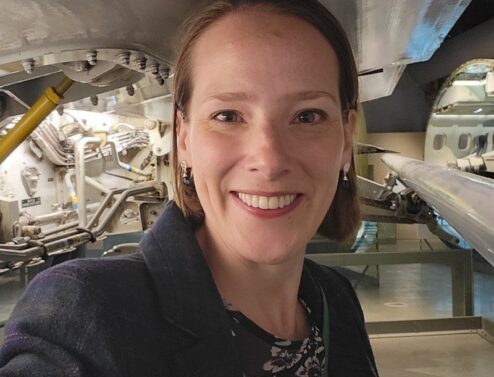Meet the IP Professional: Emily Teesdale on Building Smarter IP Strategies
With a career spanning private practice, in-house leadership, and now consultancy, Emily Teesdale has developed a deep appreciation for how intellectual property (IP) strategy underpins commercial success. Today, through her own consultancy Pivot IP, Emily helps engineering and technology businesses navigate the complex IP landscape — ensuring that protection, collaboration, and opportunity go hand in hand.
A career combining engineering and law
Emily’s path into intellectual property began with a degree in aerospace engineering and a love of technology. “I wanted to find a way to combine my technical background with something broader,” she explains. “Becoming a patent attorney allowed me to do exactly that.” Over the next 18 years, she worked in private practice with clients of all sizes, gaining experience across a wide range of technologies. Her expertise later took her in-house — first with Airbus, where she became heavily involved in collaboration projects, and then into a Head of IP role at another global aerospace company. “In that role, I was responsible for the IP terms across every kind of contract you can imagine,” Emily recalls. “I was also raising IP awareness across the business and managing a portfolio team. It was a fantastic opportunity to see how IP strategy really works at every level.” After more than two decades in demanding corporate roles, Emily took some well-earned time off to travel — a journey that would ultimately inspire the creation of Pivot IP.
A practical approach to IP strategy
When Emily returned from her travels, she wanted to use her experience to help other businesses make sense of IP in a way that was practical, strategic, and aligned to their goals. “At Pivot IP, I effectively act as Head of IP to engineering companies on a consultancy basis,” she explains. “That means helping them navigate the IP landscape in the way that’s best for them and their objectives — whether that’s advising a start-up on early IP steps, negotiating a collaboration agreement, or unpicking a complex issue to find a pragmatic solution.” It’s an approach that reflects Emily’s view of what IP strategy really means. “Any good strategy should maximise opportunities and minimise risks,” she says. “From an IP perspective, that means reducing exposure to risks like patent infringement or misuse of confidential information, while using the IP system to create and protect opportunities. It’s about far more than just obtaining patents or trade marks — it’s about embedding IP thinking into every aspect of the business.”
Recognition and collaboration
Earlier this year, Emily was recognised as a Notable Practitioner by IP Stars, a distinction that carries particular meaning. “It honestly means so much — especially as it came just six months after setting up Pivot IP,” she says. “When you’re working independently, you don’t always have the encouragement that comes from being part of a big team, so this recognition was a real boost. It’s also an honour to know that my work — which is rather different to the traditional patent attorney role — is valued.” Emily also collaborates closely with Iain Russell of Russell IP, where she provides consultancy support alongside her own practice. “I love working with Iain and am very grateful for his support,” she says. “My work there includes providing IP strategy advice and helping clients understand what to prioritise. I also still enjoy getting involved in drafting and prosecution work — it keeps me more connected to the technical side of things.”
Making IP strategy work in practice
For Emily, helping businesses develop a strong IP strategy begins with understanding where they are and where they want to go. “It’s essential to know what assets they already have, the industry landscape they are in and what their commercial objectives are,” she explains. “Only then can you design a strategy that supports those goals.”
She also highlights the importance of IP awareness and education within organisations. “You don’t always need a big budget to improve your IP position. Building awareness among employees about what to protect, what not to disclose, and when to raise potential risk issues is one of the most effective steps a company can take.”
A key part of her role involves helping clients navigate the practical realities of IP — often under pressure. Emily recalls one instance where a careful review of collaboration terms completely changed the outcome for her client. “I reviewed the IP clauses of a potential collaboration and realised they wouldn’t give my client the access they needed once the development project ended,” she explains. “It meant going back to senior management, explaining why the terms had to change, and renegotiating them at a late stage. It was challenging, but ultimately the new agreement ensured that when the technology is commercialised, my client can move forward with a secure and effective supply chain, even if the collaboration partner doesn’t proceed.”
It’s an example that perfectly captures Emily’s approach — balancing technical insight with commercial foresight. “Patent searches and freedom-to-operate analyses also play a crucial role,” she adds. “These are vital tools to understand where you sit in the IP landscape around you. Only when you know where you are can you plan where you’re going.”
The global dimension of collaboration
Having worked extensively in the aerospace sector, Emily understands that innovation today is rarely confined to one country or organisation. “Increased global collaboration is a great thing. It allows more companies to develop technology together, particularly in emerging cross-sector areas,” she explains. “But with that comes the need to ensure your IP protection reflects the global nature of your work, that your contracts are aligned across jurisdictions, and that you’re partnering with the right organisations.”
Life beyond IP
When she’s not advising clients or speaking on IP strategy, Emily loves to explore the world — quite literally. She has visited more than 70 countries, with New Zealand, Costa Rica and Japan among her favourites. “Discovering new places, especially through food, is a real joy” she says. “I love dining out and experiencing different cultures that way. I also enjoy dancing and spending time with animals — not the most compatible combination, perhaps!”

Her travels have brought some unforgettable experiences. “Getting a helicopter onto Fox Glacier in New Zealand and scrambling through the ice caves was incredible,” Emily recalls. “And volunteering at an animal sanctuary in Namibia, where I helped feed baby baboons, was truly special.” She laughs when recalling another of her adventures — hiking the Inca Trail to Machu Picchu. “Mainly for Machu Picchu itself rather than the four-day hike! I’m not much of a camper, but the porters and chefs were incredible and made the experience truly memorable.”
The value of effective IP strategy
Emily sums up the importance of IP strategy simply but powerfully. “An effective and well-implemented IP strategy enables a business to achieve — and often exceed — its objectives,” she says. “Whether it’s growth, attracting investment, or increasing valuation, the right IP approach provides the foundation for long-term success.”
Contact Emily Teesdale
📧 Email: [email protected]
🌐 Website: www.pivot-ip.com
🔗 LinkedIn: Emily Teesdale
Emily also works with Iain Russell at Russell IP, providing IP strategy consultancy and patent support.
At PatWorld, we’re proud to support IP professionals like Emily. Our comprehensive patent search and intelligence reports help inform freedom-to-operate, state-of-the-art, and competitor landscape decisions. By providing accurate and timely data, we help attorneys and consultants worldwide strengthen their clients’ IP strategies and unlock greater commercial value. Get in touch with us today to learn how we can assist with your next project.


